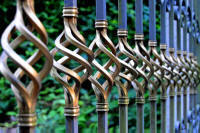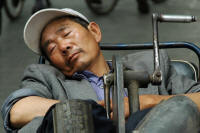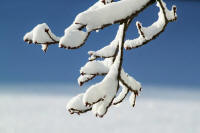Nouns: the essentials

Nouns are the words we use to give names to things, actions and people. There are different types of nouns but they all do the same things. Generally, nouns function as the subjects or objects of verbs, like this:
- John enjoys camping
- The machine broke
In 1., the noun camping is the object and John is the
subject.
In 2., the noun is machine and is the subject.
So, we can talk of subject nouns and object nouns.
The second essential is that, although in following we focus on
individual words for simplicity's sake, nouns should be described as
noun phrases even if they only consist of one word. The noun
phrases are underlined in these examples:
My car
has broken down
She opened the letter
from her mother
The old hospital
is being rebuilt
I like strawberries
Mary's sister
enjoyed the classical concert
That's the man who
owned the big house on the corner
and in the last example, we have three noun phrases, embedded in one
another: the big house,
the corner and
the man who owned the big house on
the corner.
So, we can now talk of subject noun phrases and object noun phrases
with some confidence and having the right terminology helps our
understanding.
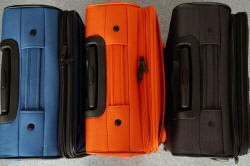 |
Three sorts of noun phrase |
On this site, we use this classification but you may see others, especially in older books.
- Common nouns
are the most frequent and apply to things, feelings and people. For example:
people, house, apple, happiness, sugar, use, table, computer
and many thousands more.
They are of two basic sorts:- count nouns
take a plural and can come with a singular or plural verb form. For example:
There are two cows over there
She has a new car
That's the first problem we need to solve
We have four good neighbours
etc. - mass nouns
refer to things we do not count and come only in the singular (except in some special uses). For example:
The furniture is worn out
Would you like some coffee?
I enjoy running
She has no time
We are taking food with us
etc.
For more about the difference between count and mass nouns, read on.
- count nouns
- Proper nouns
are usually spelled with a capital letter (in English) and refer to people, jobs, times and places. For example:
I spoke to Fred
He is the Chief Executive Officer
Come on Monday
I went to Berlin
There are some special rules for these, explained below. - Collective nouns
refer to groups of people and things and can be either singular or plural. For example:
They have joined a new class
She keeps a flock of sheep
The police are coming soon
The government is about to fall
For more, see below.
 |
Proper noun phrases |
| Albert Einstein |
Proper nouns are the names for people and places. They usually begin with a Capital letter. There is a range of types and a number of difficulties for learners and teachers:
- People
- Mary, Tiger Woods, Mr Smith, Uncle
Fred
etc.
English does not use an article with proper nouns for people unless we are distinguishing two people with the same name as in, e.g.:
No, I don't mean the John who works in IT, I mean the John from Finance.
Many languages routinely use an article with people's names so elementary learners in particular may say something like.:
*I'll talk to the Mr Smith
English can use an article with names if there is some restriction:
the young King Edward, the old Mr Smith etc.
English, exceptionally, uses the articles with some titles:
the Duke of Westminster
the Reverend Smith
but not
*the Bishop Smith
*the Lord Michael
- Mary, Tiger Woods, Mr Smith, Uncle
Fred
etc.
- Jobs and Positions
- The President, The Pope,
The Chief Executive, The Queen etc.
We usually put the definite article, the, before these nouns because there is only one of them that is the reference (although, of course, there are a number of presidents, queens, kings, prime ministers and so on, but both speaker and listener know which one is the topic). This is, incidentally, known as homophoric reference but that is not something with which you should trouble your learners.
- The President, The Pope,
The Chief Executive, The Queen etc.
- Times
- Monday, February, the summer, Christmas, Easter
- Capitalisation:
Days, months and festivals are capitalised but seasons are generally not capitalised in English (other languages do things differently). - Article use:
When the noun is used with a unique meaning for days, months and festivals, the article is omitted:
On Monday, in February 1934, at Christmas etc.
When the nouns are restricted in some way, the article is used, especially with the adjectives previous and following:
the previous March, the following Christmas, the May of 1968, the Monday afterwards
The adjectives next and last do not require the article if the time is implicit in what is being said:
She arrived last Wednesday and is leaving next Thursday
They spent last Easter with us and will return next Christmas
but when it is not clear from the point of speaking which time is the topic, the article is used:
She left the next Wednesday, having arrived the Thursday before
I spent the next Whitsun in Rome
Seasons are a little tricky. They usually function as common countable nouns, see below, and take the article normally:
I enjoy the summers here
The winter is always harsh in Scotland
They can, however, function like other times and the article is then omitted:
She came in spring and stayed till autumn
Usually, seasons are not capitalised. - Plurals:
Days of the week and seasons regularly take plurals:
I spent many summers in Spain
I get bored on Sundays
- Places and buildings etc.
- Britain, Germany,
Margate, London, Lake Victoria, Jamaica, The Thames, The Suez
Canal, Baker Street, St Paul's Cathedral, The Tate Gallery etc.
The use of the article is idiomatic in English (not so in many languages) so this is a cause of a good deal of error. There are some rules of thumb, however:- rivers, mountain ranges and
canals
We usually put the before these: The Thames, The Nile, The Himalayas, The Alps, The Suez Canal, The Panama Canal - lakes, countries, islands, streets and
cities
We do not usually put the before these:
Lake Tanganyika, France, Crete, Rome
But we do put the in front of the name of the country if it contains a classifying adjective like united or Arab:
The United States of America, The United Kingdom, The Federal Republic of Germany, The United Arab Emirates
One or two countries have, in the past, been used with an article but the practice is dying out: The Sudan, The Argentine, The Gambia, for example.
There are some exceptions including:
The Hague, the Bronx, the City (of London), The Strand, The Mall etc. - buildings and mountains
This is a very idiomatic area and not easy to learn or teach because there are rules of use rather than rules of grammar. Again, a classifying adjective denoting the name of the building or mountain will usually compel the use of the article.
The Guggenheim Museum, The British Museum, Scotland Yard, Mont Blanc, The Eiger - continents
Do not usually take the article and are always capitalised so:
Asia, Europe, (South) America, Antarctica etc.
but
the Antarctic, the Arctic
- rivers, mountain ranges and
canals
- Britain, Germany,
Margate, London, Lake Victoria, Jamaica, The Thames, The Suez
Canal, Baker Street, St Paul's Cathedral, The Tate Gallery etc.
 |
Collective noun phrases |
In all languages, some nouns are used for groups of things or
people. In English, these can be both singular and plural but
in most languages they are only singular. For
example, in English, we can say:
The army is very large (thinking about it as a single thing)
and
The army are helping (thinking about
the army as a lot of
individual people)
We can also have:
The football team are playing
on Sunday
and
The football team
is playing on Sunday
In the first one, we are thinking about all the players
separately; in the second one we are thinking of
it as a single
thing, the team.
Other collective nouns are, e.g., navy, crew, flock, herd, staff,
family, committee,
government, class, staff etc.
(There is a difference between collective nouns which are not
usually followed by the of + noun phrase and assemblage
nouns such as:
a swarm of bees
in which the of-construction is usually seen.)
In American English these
words are normally used with a singular verb as is the case in most
languages.
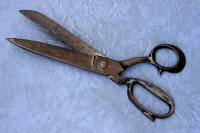 |
Plural nouns |
One class of nouns appears only in the plural.
- Pairs:
Some tools and items of clothing appear in the plural because the phrase a pair of is usually omitted in English:
scissors, pliers, tongs, shears secateurs etc.
shorts, trousers, tights, flannels etc. - Pluralia tantum (the singular of which is
plurale tantum):
These are nouns which only appear in the plural or are used in the plural with a particular sense. There are plenty of these and when they occur in your teaching, you need to point out their special use. Some examples will suffice (a '-' in the second column means that there is no obvious singular noun equivalent):
plural singular difference funds fund money vs. a collection of money brains brain intelligence vs. thinking organ customs custom checking of luggage vs. usual practice guts gut courage vs. digestive organ clothes cloth attire vs. piece of material arrears - amends - annals - auspices - contents - fireworks firework display vs. individual device greens - heads head side of a coin vs. part of the body looks look appearance vs. the act of looking minutes minute record of proceedings vs. time period pains pain efforts vs. unpleasant feeling remains - surroundings - tropics tropic warm areas of the world vs. line of latitude wits wit intelligence vs. amusing person
This list can be greatly extended
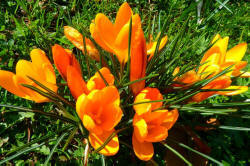 |
Plural markers in nouns |
| crocuses or croci? |
The regular plural system in English is simple and the requires
-s or -es suffixes, depending on how the singular form
ends. If it ends with an e we just add -s
and if it ends in any other letter, we add -es.
There are, however, some exceptions and issues to note:
- The pronunciation of the plural ending in English is either
/s/ or /z/ but it is a predictable system. It works like
this:
The word house is an exception./t/, /p/, /f/, /k/ /θ/ endings
plural pronounced as /s/All other endings
Plural pronounced as /z/cats
cups
kick
laughs
mathsboys
girls
fathers
homes
cubs
This is a regular system to which there is a guide linked below.
The plural of words ending in f is a bit irregular so we get:
and so on.calf – calves
elf – elves
half – halves
hoof – hooves
leaf – leaves
life – lives
loaf – loaves
But the plural of roof is seen both as roofs and ?rooves (and differently pronounced). The word wharf also has two acceptable plural forms, wharves and wharfs, as does dwarf. - A small number of nouns have retained older English plural forms involving
a change to the vowel or an ending other than a simple -s or -es. They include words like
which simply have to be learned and taught individually. That is, by the way, almost a complete list.child – children
die – dice
foot – feet
goose – geese
louse – lice
mouse – miceman – men
ox – oxen
penny – pence (or pennies)
person – people
tooth – teeth
woman – women - Zero-marked plurals
Some nouns have no marking in the plural (a Ø plural) but the plural still exists. These often (not always) refer to animals:
Some of these words do take regular plurals when we are considering small numbers of identifiable entities:(air)craft
bison
deer
elk
fish
grouselobster
moose
salmon
sheep
shrimp
trout
six fishes
two shrimps
etc.
but some resist any kind of plural marking.
Note: These are all count nouns and should not be confused with mass nouns which take no plural. No plural form is not the same thing as a zero plural form. - Invariable unmarked plurals
A few words in English are always plural but take no inflexion to show it. Examples are:
Again, these are unmarked plural forms or countable nouns, not mass nouns.cattle
clergy
folk
gentrypeople
police
poultry
vermin
  |
Mass nouns and Count noun phrases |
|
| milk | pencils | |
The distinction between these two types of nouns either does not exist at all in some languages or is very differently handled. The problems for learners in this area are extensive.
Most nouns in English are count nouns. Count nouns have a
singular (for one) and plural (for more than one). This means
we can say, for example:
I have three pencils
I want that pencil
The pencil is here
Those pencils are no good
Please give me a pencil
I have several pencils on the desk
Count nouns cannot usually appear in the singular without an
article (a(n) or the) so we do not find:
*Pencil is needed
*Person is here
etc.
In some set phrases, the rule is broken so we do find:
Please write in pencil
They walked arm in arm
Many nouns in English are mass nouns. These nouns do not
have a plural. We can say, for example:
I want that milk
I have some milk
The milk is here
This milk is bad
Please give me some milk
I have some milk in the glass
Mass nouns always use a singular verb and never take a plural.
They can also appear without an article as in:
Milk is good for you
Most mass nouns are:
|
|
|
|
|
There are hundreds of mass nouns in English but here is a list of very common ones:
|
advice air anger art bread cash cheese childhood clothing coffee damage danger education energy equipment fire food freedom friendship |
fun furniture gold hair happiness health heat help honesty housework humour imagination information intelligence kindness knowledge labour laughter love |
luck management metal milk money music news paper pronunciation punctuation quality quantity rain rice rubbish safety sand shopping sleep |
smoke snow soup sport strength sugar sunshine tea time traffic transportation travel understanding warmth water weather weight wood work |
That list is available as a PDF document from the link in the table at the end.
It is possible, of course, to make mass nouns countable by the
addition of what is called a partitive or a quantifier as in, e.g.:
three hours' sleep
a piece of iron
a bar of chocolate
two means of transportation
pints of milk
drifts of snow
etc.
As you will see, however, the choice of quantifier or partitive is
not an easy one to make.
 |
The grammar of mass and count noun phrases |

| Noun | Before the noun | But ... | For example |
 Singular count nouns like pencil, car, house, person, cat, elephant |
one, every, any, this, that, the, a(n) | We must always use a determiner with these nouns | I have
only one blue pencil Every child's pencil is broken Any black pencil is OK This old pencil is no good That pencil is better but not: *Pencil is broken |
 Plural count nouns like pencils, cars, houses, people, cats, elephants |
many, both, some, several, these, those, the, a couple of or no word |
a/an is not possible: *A people arrived It is possible to have no determiner: People arrived |
I have
many pencils I want some pencils There are several pencils on the desk These new pencils are no good Those pencils are better Give me a couple of sharp pencils Both pencils were broken Pencils must be sharp |
 Mass nouns like milk, information, hope, education, tea |
much, little, less, more, this, that or no word | How much
milk do we have? We have a little milk There is less milk in the fridge Give me some more milk This milk is bad That milk is better Milk is good for children |

| Noun | After the noun | But ... | For example |
 Singular count nouns like pencil, car, house, person, cat, elephant, team |
a singular verb like is, breaks, opens, lives | Singular
collective nouns (like team or family) can be plural: The family have arrived |
The pencil
is on the floor The car was clean The houses look nice The person is ringing the bell The cats sleep here The elephant smells awful The team is coming The team are playing |
 Plural count nouns like pencils, cars, houses, people, cats, elephants, team |
Always a plural verb | The
pencils are on the desk The cars have arrived The houses look beautiful The people are here The cats are eating The elephants are angry The team are here Her family are really friendly |
|
 Mass nouns like milk, information, hope, education, tea |
Always a singular verb | No exceptions | The milk
is in the fridge The information is useful Hope is important Education is necessary Tea is common in England |
Try a simple matching test on this area.
| Related guide | |
| word class map | this link takes you to the index of guides to word classes on this site |
| in-service guide to nouns | for a guide which includes some of the above (with extensions) and focuses on grammar more |
| pronouncing inflexions | this covers the plurals of nouns and also other inflexions in English |
| mass nouns | for a PDF list of the most common mass nouns in English |
| concord | for more about verb forms with nouns in English |
| (un)countability | for more on mass and count concepts in English |
| articles essentials | for an overview of the article system |
| articles | for a fuller guide to the article system in the in-service section |
| determiners | for a consideration of how nouns are determined (in-service guide) |
| modification | to see how noun phrases are constructed and get some ideas about how to teach them |
| subject and object | to see how nouns and verbs work together to make meanings |

